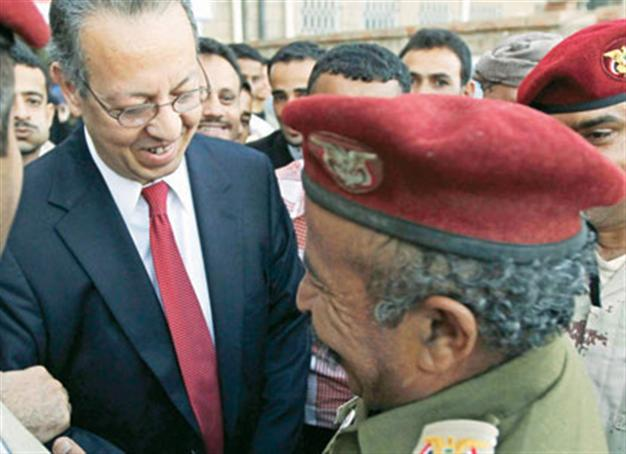
UN envoy Jamal Benomar speaks to a defected army soldier at university of Sanaa after meeting with opposition Nov 12. REUTERS photo
Yemen’s vice president said on Nov.12 that the government and the opposition were close to finalizing a deal aimed at easing President Ali Abdullah Saleh out of power, one day after 17 people died in violence in the city of Taiz.
The state’s Saba news agency said Abd-Rabbu Mansour Hadi made his remarks during a meeting with visiting U.N. envoy Jamal Benomar and ambassadors of the five permanent members of the U.N. Security Council in the capital Sanaa. “We all have a task represented in translating U.N. Security Council resolution 2014 into action on the ground, and this is a task the ruling party and the opposition must shoulder together,” Saba quoted Hadi as saying.
The United States said on Nov.12 that it was “deeply troubled” by reports of attacks on civilians in the Yemeni flashpoint city of Taez, and urged all parties to exercise “maximum restraint.” In a statement, State Department spokeswoman Victoria Nuland also called for a “prompt investigation” into the deaths of civilians in Taez, Yemen’s second city located south of the capital Sanaa. On Nov.11, government forces shelled a protest site in Taez, killing 15 civilians, including at least three women and three children, according to medics. At least 40 other people were wounded. The violence erupted when security forces loyal to President Ali Abdullah Saleh began shelling areas around Freedom Square, the epicenter of the protest movement in Taez. “If President Saleh cares about Yemen’s future and the well-being of the Yemeni people, he must immediately initiate a full transfer of power” within the framework of a Gulf peace plan, Nuland said.
Benomar flew to Yemen on Thursday to discuss implementation of the U.N. Security Council resolution passed in October endorsing the deal, drawn up by Gulf nations, which calls on Saleh to end his 33-year rule and hand over power to his deputy. Hadi told the diplomats that discussions with the opposition have covered nearly 85 percent of the Gulf deal, without going into further detail, Saba reported. Saleh has repeatedly backed down on signing the accord, first proposed in April to end months of protests against his rule that have destabilized Yemen and rattled Saudi Arabia, the world’s largest oil exporter which shares a long and porous border with Yemen.
Compiled from AFP and Reuters stories by the Daily News staff